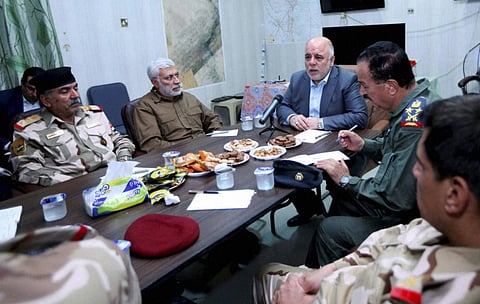Iraq at a crossroads
The people are united in protesting corruption, regardless of their political affiliations or sectarian and ethnic backgrounds

Scenes of mass protests in Iraq are not strange for a country that witnessed a wave of sweeping protests during the former monarchy and republican regimes. However, some of these protests saw bloody clashes and just a few of them achieved their demands.
It has been more than a month since the Iraqi people took to the main streets and squares, protesting corruption and the deteriorating situation and poor services in the country. The Iraqi people are united in these protests regardless of their political affiliations or sectarian and ethnic backgrounds, calling for the eradication of corruption as the public’s key demand. The question that arises here is: Can the protesters achieve their objectives?
These demonstrations are the first real test for the government of Iraqi Prime Minister Haider Al Abadi in how to deal with protesters who are taking to the streets to demand their rights. The administration of Nouri Al Maliki, the former prime minister, had handled protests in a bloody manner.
The protests are organised and led by a group of youths who have no affiliation or link to any of the political parties in Iraq. These protests came late, but better late than never, as the saying goes. This is because there is no other way to resolve the deteriorating situation in Iraq without a popular movement since people are frustrated with the performance of the Iraqi parliament, which is already accused of corruption.
Al Abadi made a solemn vow to clamp down on corruption with an iron fist and he is supported by the religious authority in Al Najaf. Nevertheless, he lacks a comprehensive programme and timetable, as well as the appropriate tools to combat corruption and impose reforms. Iraqi officials involved in the political process of legislative, executive and judicial authorities are not keen on these reforms, although they pretend to be otherwise because they believe these protests are aimed at overthrowing Islamist parties and consequently, the Iranian influence.
The National Alliance to which Al Abadi belongs and is leading the political process is unqualified to carry out the required reforms because it is already accused of corruption and has a long record of failure over the last 10 years of its tenure. The stand of this alliance remains unchanged due to its submission to a foreign power.
The alliance has not changed its positions because of the educational and ideological backgrounds of its leaders and their strong attachment to their own sectarian identity instead of national allegiance.
Al Abadi has gained unexpected power under the pressure exerted by the protests. Some Iraqis are expecting a lot from Al Abadi due to the widespread corruption, amounting to wastage of billions of dollars in Iraq’s funds and the belittling of its sovereignty. Iraq’s exceptional situation demands extraordinary measures by Al Abadi. If he is truly serious about fighting corruption, then he is bound to be confronted by his own party and parliamentary plots.
The cards are all in the hands of the National Alliance itself, as some of its leaders did not conceal their concern over these protests and accused secular parties of being behind these demonstrations in order to shake up Islamist groups.
The alliance has its own concepts on the size of the crisis and how to manage it, as well as plans to deal with people in the streets — calming them down and quelling their anger through some concessions. These may involve excluding some faces from the political scene, using them as scapegoats, so as not to weaken its control over affairs in the country, because the alliance will not surrender its power so easily. The existing political balance is not in the interest of those calling for a shift towards a democratic civil regime and are not optimistic about real reforms. In light of the weakness of forces calling for reform and fighting corruption, it is very difficult to bring about true reforms. Indeed, corruption is deeply rooted in Iraq, where corrupt leaders have power, influence and funds and occupy very sensitive positions in all state institutions and services. They also have armed militias and are strongly supported by a regional power.
They have vast experience in misleading people and weakening their demands and will spare no effort to penetrate these protests and implant their own peoples among them to mislead these demonstrations or intimidate the protestors through various means, including assassinations, which already happened in more than one Iraqi city.
Bringing about real reform in Iraq is not an easy task, though it may not be impossible. This means that Iraq needs to embrace a gradual political approach that paves the way for the rise of a new political elite within a new political process, away from sectarian and ethnic quota. This approach begins with excluding all sectarian parties involved in corruption. Other solutions include suspending the constitution, dissolving the parliament and forming a caretaker government for a specific period. This needs to be followed by new elections on the basis of a new electoral law.
Mohammad Akef Jamal is an Iraqi writer based in Dubai.


